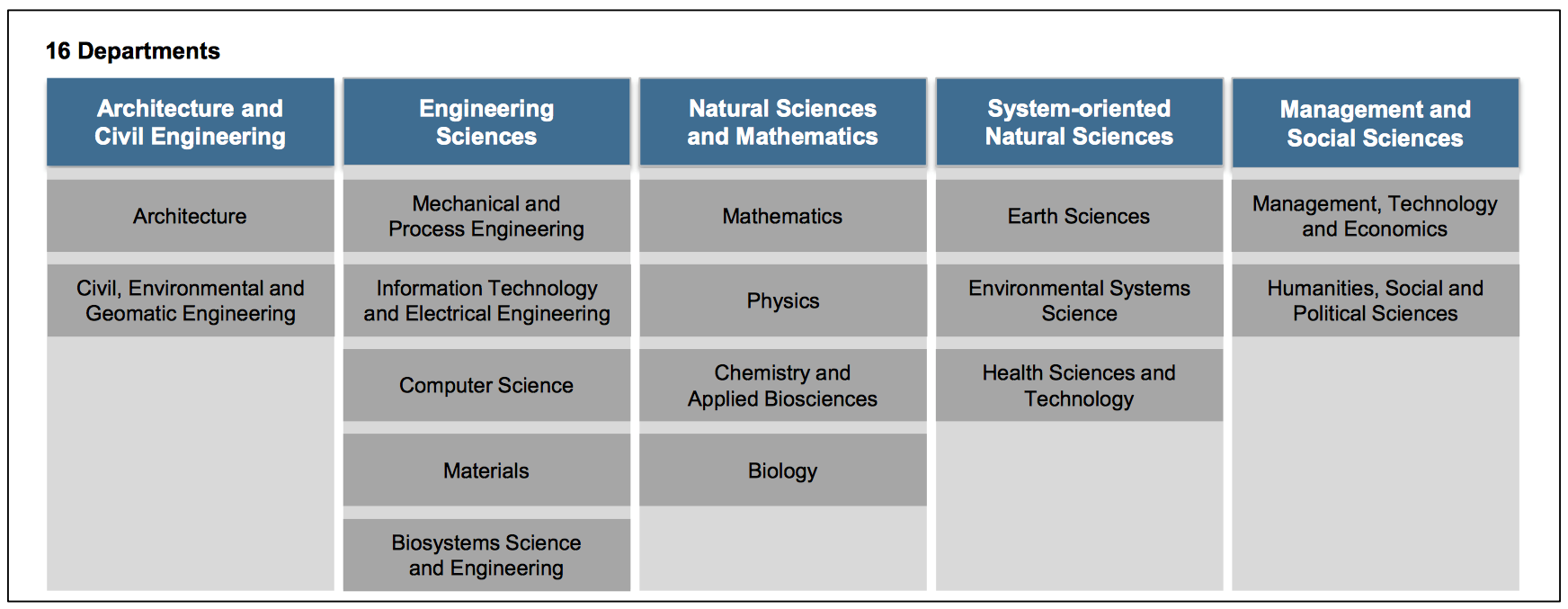Congratulations, you have almost started! In this chapter, we would like to give you a brief overview of ETH Zurich (so that you don’t get confused by all the abbreviations people love to use) and the things you should do during your first day at work.
4.1. Orientation Event
To get you started properly, ETH Zurich organizes an introductory program for newly arrived doctoral students. The first part of the introductory program consists of an orientation event held in English, at least twice a year. The aim is to introduce doctoral students to structures and objectives of ETH Zurich, whilst offering an overview of the main services provided by ETH. In these events, you meet the other new doctoral students in your department and the president of your departmental association to build your network and meet your representatives. You also get introduced by the departmental HR and other resources that can aid in the years ahead. The second part of orientation is called the “Shape Your Doctorate” workshop, which focuses on the theme “expectations, communication, duties and rights”. The workshop is ETH wide and not just for your department, and discusses mutual expectations of doctoral students and supervisors. It further highlights administrative bodies, and reflects on the role of communication in aligning and fulfilling these expectations. For detailed information about how to attend these events, you can keep a closer eye on the AVETH public agenda which announces the upcoming events.
4.2. Organisational Structure of ETH
ETH Zurich
ETH Zurich opened its doors in 1855. The official English translation for “Eidgenössische Technische Hochschule” is Swiss Federal Institute of Technology. ETH Zurich defined excellence pillars in Education, Research and Knowledge Transfer. It has more than 500 professors, 18’000 Bachelor’s and Master’s students from 126 countries, and more than 4’170 doctoral students. Over 32 percent of the whole student body are female. 21 Nobel-Prize laureates have contributed to the success story of ETH Zurich.
ETH Zurich has a very strong presence in the industry. Since 1996, 440 spin-off companies have been founded at ETH Zurich. Just during 2019, 30 spin-off companies have been founded, at ETH Zurich.
ETH spreads over two main campuses: ETH Zentrum campus and ETH Hönggerberg campus. In addition to these two, there are other small campuses across Switzerland: Irchel, Basel, Lugano, Oerlikon, Technopark, Rueschlikon, Schwerzenbach, and Atelier Gisel.
A wealth of information on ETH is available at www.ethz.ch/en/the-eth-zurich/portrait.
ETH Domain
The ETH Domain is organized on a federal level in Switzerland, is regulated by the ETH Zurich Act and is responsible for facilitating technical research and education. This network is consisted of ETH Zurich (Eidgenössische Technische Hochschule Zürich), EPFL (École Polytechnique de Lausanne), and four national research institutes, the EMPA (Swiss Federal Institute for Materials Testing and Research), EAWAG (Swiss Federal Institute of Aquatic Science and Technology), PSI (Paul Scherrer Institute) and WSL (Swiss Federal Institute for Forest, Snow and Landscape Research). Additionally, parts of the ETH Domain are the ETH Board, responsible for the strategic management and the ETH Appeals Commission, an independent appeals body.
More information is available at ETH Zurich domain.
Governance
ETH Zurich is governed by the Executive Board, which is headed by a President. It enacts decrees and administrative rules, regulates the organization of the school and decides on the founding, the renaming and the closure of institutes. The Board consists of seven members:
The President, who oversees the entire university. Currently Prof. Dr. Joël Mesot.
The Rector, who is responsible for education, including doctoral studies). Currently Prof. Dr. Sarah Springman.
The Vice-President for Research. Currently, Prof. Dr. Detlef Günther.
The Vice-President for Finance and Controlling. Currently, Dr. Robert Perich.
The Vice-President for Knowledge Transfer and Corporate Relations. Currently, Prof. Dr. Vanessa Wood.
The Vice-President for Infrastructure. Currently, Prof. Dr. Ulrich Weidmann.
The Vice-President for Personnel Development and Leadership. Currently, Dr. Julia Dannath-Schuh.
Read more about the ETH Executive Board here.
University Assembly
According to the Federal Act on the Federal Institutes of Technology (ETH Zurich Act), there are four member groups (stakeholder groups) at ETH Zurich. These are VSETH (representing students), AVETH (representing doctoral students, post-docs, and higher scientific staff), PeKo (representing the technical- and administrative staff), and the KdL (representing teaching staff, i.e. professors). These groups have the right of opinion-forming and participation in the pre-decision process. Doctoral students belong to the scientific staff community at ETH Zurich and are thus stakeholders in the institution. The interests of the groups are represented at political level by the respective ETH-wide and departmental associations.
The University Assembly (“Hochschulversammlung”) is a body where the four member groups are equally represented. Each association elects five members of the University Assembly. The role of the Assembly is to ensure the participation of stakeholder groups in the decision-making processes of general interest at ETH Zurich and ETH-Domain level. The Assembly is thus entitled to express an opinion on all normative acts of the ETH Board and ETH-Zurich Executive Board, and comment on the budget and the planning, the abolition/creation of teaching and research units, as well as on annual reports. Depending on the topics discussed, the Assembly may invite guests from the ETH Domain and members of parliament.
Are you interested in the politics and the governance of universities and research institutions? Then the University Assembly is a perfect place for your voice to be heard! Join AVETH and learn more about how to become elected as our representative in the Assembly.
Departments
ETH Zurich is divided into 16 departments covering five disciplinary areas: The head of a department, who represents the department internally and externally, is elected for a period of two years. To ensure participation in decision-making at departmental level, there is the Department Conference (Departementskonferenz, the highest body of the department). The responsibilities of the Department Conference are diverse and include academic planning, the adoption of study-related regulations, establishment of rules or procedures for the department and other decision making. Much like the University Assembly, every Department Conference is attended by representatives of the professors, students, and scientific staff.

Figure 1. Overview of all 16 departments within ETH Domain.
Quite often, important decisions regarding department-specific doctoral study regulations are made at the Department Conferences. Thus, if you wish to change things for the better in your department, join the Department Conference and defend the interests of your local scientific staff community.
Other committees usually functioning at department level are:
– Professor’s Conference (Professorenkonferenz), which comprises all the professors and adjunct professors in the department.
– Teaching Committee (Unterrichtskommission), which deals with study-related issues.
Contact your AVETH department association for more information about participating in internal political life or just contact the AVETH Politics team directly!
Table 2. Overview of DK representation by Professors and Scientific staff

4.3. The Academic Calendar
Please note that ETH Zurich’s academic calendar is different from those found at many other continental European universities because it follows the American system. www.ethz.ch/en/news-and-events/academic-calendar
4.4. HR Registration: Employee Status
Before receiving your contract, you will have to register with HR. Your group secretary or HR departmental manager will contact you for that purpose. You might receive your contract before your first day by post or on your first day from the group secretary. Information on your employee status can be found on your personal ETHIS page once you have registered successfully. For safety and insurance purposes make sure to have signed your employment contract before starting your first day of work.
Together with your contract, you will also receive a book about your rights and duties as an employee in Switzerland. The HR department also has an updated version of this information on their homepage
4.5. Doctoral Registration: Student Status
Doctoral registration is performed by doctoral administration. We urge you to read their webpage carefully as it contains a wealth of important information!
You need to fill out the registration form (available on the webpage) and have it signed by your professor. Your doctorate officially begins with this registration.
If you register between semesters, please note that you will be matriculated starting from the following semester. Please note that doctoral administration is not responsible for processing your visa and employment contract. Your supervisor and human resources are responsible for processing these documents.
Once doctoral administration receives your complete application, you will be matriculated and receive an ETH card (“Legi”) within approximately two weeks after submitting your application (if you do not have one already).
4.6. ETH Card (“Legi”)
Every member of ETH has their personal ETH card (Legi). It acts both as visual and as electronic identity card. Outside ETH, the ETH card serves as a proof of you being a student, allowing you to get access to discounts and more. At ETH, it allows you to enter sports grounds, cafeteria, and buildings and it also serves as a library card. The ETH card must be validated (updated) every semester at one of the validation terminals. After validation, its date of expiry is extended until the end of the following semester. The letter “S” on the card shows that you officially have student status. Access to buildings outside normal working hours is granted upon request. Just ask the group’s secretary for it. Your personal entrance key to buildings can be set via www.adressen.ethz.ch.
4.7. Mystudies and nethz-Account
www.mystudies.ethz.ch serves as a platform to manage your studies., i.e. there you can enroll in the semester and courses, register for exams and so on. You need to enroll for each new semester. After having enrolled for the next semester, you can re-validate your ETH card and you will receive a set of matriculation confirmations by regular mail. You will be notified by email if enrolling in the next semester is possible. You will have to log in with your nethz-account. Nethz is the central user management system of ETH Zurich. Go to www.passwort.ethz.ch to see what you can do with your nethz-account or if you have to change your nethz-password.
4.8. ETHIS (ETH Information and Support System)
ETHIS is the ETH Zurich web portal for personalized access to data, applications and evaluations relating to finance and personnel issues. In addition to reports the following workflows are currently available:
– AAA (Annual Academic Achievements)
– Professional expenses
– Procurement (information technology, purchasing coordination)
– Recording of customer invoices
– Recording of supplier invoices
– HR workflow (appointments, resignations, accounting of hourly rates etc.)
– Inventory databank (new recording, change of ownership, cancellation)
– Time management
ETHIS is available for all ETH staff; however, the content displayed varies according to user authorisation. ETHIS is being constantly developed so that as many administrative functions as possible can be processed on the platform. For more information see www.ethz.ch/services/en/finance-and-controlling/ethis.html.
